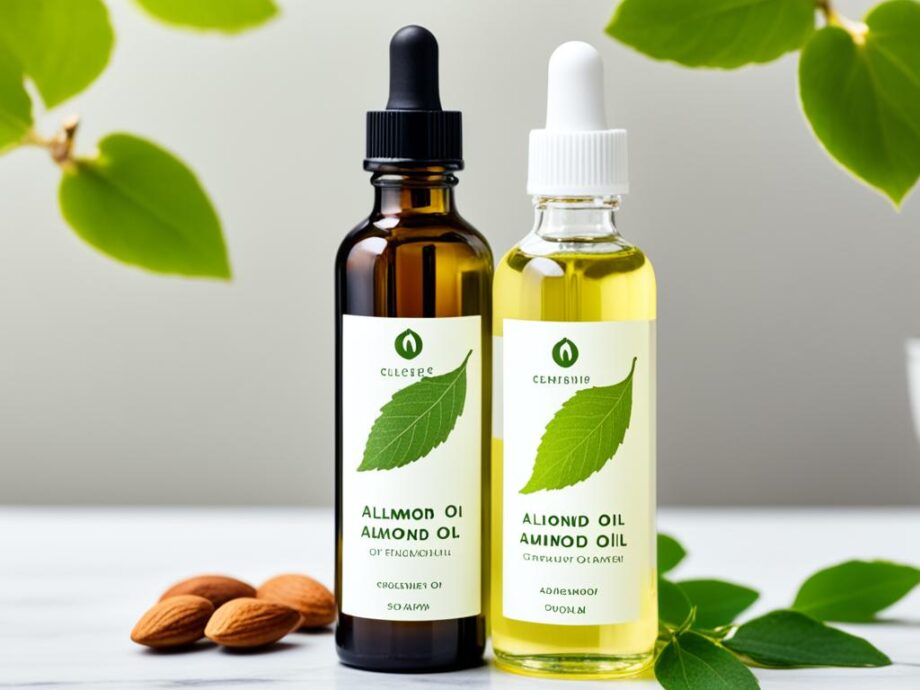Welcome to our comprehensive guide on almond oil and grapeseed oil for skin. If you’re looking for natural skincare solutions, these two oils are undoubtedly popular choices. But which one is more beneficial for your skin? In this article, we’ll compare almond oil and grapeseed oil to determine which oil emerges as the winner in terms of skin benefits. We’ll dive deep into their unique properties, explore their effectiveness in addressing various skin concerns, and provide you with all the information you need to make an informed decision.
Key Takeaways:
- Almond oil and grapeseed oil are two popular oils for skincare.
- Almond oil is rich in vitamins, minerals, and fatty acids, making it an excellent source of nourishment for the skin.
- Grapeseed oil contains antioxidants that protect the skin from environmental damage.
- Both oils offer unique advantages, but the choice ultimately depends on your individual skin concerns and preferences.
- Experimenting with both oils can help you determine which one works best for your skin type.
Understanding Almond Oil
Almond oil is a skincare superhero that has been cherished for its numerous benefits for centuries. Its rich composition of vitamins, minerals, and fatty acids makes it an excellent choice for nourishing and moisturizing the skin. Let’s take a closer look at why almond oil is a must-have ingredient in your skincare routine.
Vitamins, Minerals, and Fatty Acids
Almond oil is packed with vitamins A, E, and D, which are known for their skin-nourishing properties. These vitamins help in improving the overall health and appearance of the skin by supporting its natural healing process and promoting a youthful complexion.
In addition to vitamins, almond oil also contains minerals like magnesium, calcium, and potassium, which play a vital role in maintaining healthy skin. These minerals help in replenishing the skin’s moisture levels, preventing dryness, and enhancing its natural radiance.
Furthermore, the fatty acids present in almond oil, such as oleic acid and linoleic acid, contribute to its nourishing properties. These fatty acids act as emollients, which means they form a protective barrier on the skin’s surface, preventing moisture loss and leaving the skin soft and supple.
Anti-inflammatory Properties
One of the remarkable qualities of almond oil is its anti-inflammatory properties. It contains compounds like flavonoids and phenolic acids, which help in soothing irritated skin and reducing redness. By incorporating almond oil into your skincare routine, you can calm inflammation and promote a healthier complexion.
Additionally, almond oil can be beneficial for individuals with sensitive skin or skin conditions such as eczema or psoriasis. Its gentle nature and soothing properties make it a suitable choice for relieving itching and discomfort associated with these conditions.

“The nourishing properties of almond oil make it an excellent choice for moisturizing and soothing the skin.” – skincare expert
Exploring Grapeseed Oil
Grapeseed oil is a powerhouse ingredient when it comes to skincare. With its unique properties, this oil offers a range of advantages that can help nourish and protect your skin.
One of the key benefits of grapeseed oil is its high antioxidant content. Antioxidants play a crucial role in combating free radicals, which are unstable molecules that can damage our skin cells. By using grapeseed oil, you can help protect your skin from environmental damage, including pollution and UV radiation.
In addition to its antioxidant properties, grapeseed oil is also known for its lightweight texture. Unlike heavier oils, grapeseed oil absorbs quickly into the skin, making it suitable for all skin types. Whether you have oily, dry, or sensitive skin, grapeseed oil can provide the hydration your skin needs without clogging pores or leaving a greasy residue.
Furthermore, grapeseed oil contains essential fatty acids, such as omega-6 and omega-9, which help maintain the skin’s natural barrier and promote overall skin health. These fatty acids not only nourish the skin but also help retain moisture, keeping your skin hydrated and plump.

With its antioxidant-rich composition, lightweight texture, and compatibility with various skin types, grapeseed oil is a valuable addition to any skincare routine. Whether used alone or in combination with other skincare products, grapeseed oil can help enhance your skin’s health and appearance.
Comparing Almond Oil and Grapeseed Oil for Skin
In this section, we will compare and contrast the benefits of almond oil and grapeseed oil for the skin. Both of these natural oils offer a range of advantages when it comes to skincare, but understanding their unique properties can help you make an informed decision about which one to incorporate into your beauty routine. Let’s dive in:
The Benefits of Almond Oil
Almond oil is celebrated for its nourishing and moisturizing properties. Rich in vitamins A, E, and D, as well as fatty acids, this oil deeply hydrates the skin, leaving it soft and supple. Its emollient nature makes it an excellent choice for those with dry or sensitive skin, as it helps soothe irritation and reduce inflammation. Almond oil is also known to promote collagen production, which can help minimize the appearance of fine lines and wrinkles, promoting a youthful complexion.
The Advantages of Grapeseed Oil
Grapeseed oil, on the other hand, boasts high levels of antioxidants such as vitamin C and E. These antioxidants play a key role in protecting the skin against environmental damage and free radicals, helping to minimize the signs of aging. In addition, grapeseed oil is lightweight and easily absorbed, making it suitable for all skin types, including oily and acne-prone skin. Its non-comedogenic properties ensure that it won’t clog pores, allowing the skin to breathe and maintain a healthy balance.
A Side-by-Side Comparison
Now, let’s compare almond oil and grapeseed oil in terms of their specific benefits for skincare:
| Benefits | Almond Oil | Grapeseed Oil |
|---|---|---|
| Moisturizing | Deeply hydrates and nourishes the skin | Lightweight and quickly absorbed |
| Anti-Aging | Promotes collagen production, reduces fine lines and wrinkles | High in antioxidants, protects against signs of aging |
| Complexion Improvement | Softens and smooths the skin, improves overall texture | Helps even out skin tone, brightens complexion |
| Addressing Skin Conditions | Calms inflammation, soothes dry and sensitive skin | Non-comedogenic, suitable for oily and acne-prone skin |
As you can see, almond oil and grapeseed oil offer distinct advantages depending on your specific skincare needs. Consider factors such as your skin type, concerns, and personal preferences when choosing between the two. You may even find that a combination of both oils complements your skin perfectly.

By the end of this section, you should have a clearer understanding of which oil is better suited to your skin’s unique requirements. Whether you opt for the nourishing properties of almond oil or the antioxidant-packed benefits of grapeseed oil, incorporating these natural oils into your skincare regimen can enhance the health and radiance of your skin.
Conclusion
In conclusion, both almond oil and grapeseed oil offer unique advantages for skincare. Almond oil is known for its nourishing and soothing properties, thanks to its rich composition of vitamins, minerals, and fatty acids. It deeply moisturizes the skin, leaving it soft and supple. On the other hand, grapeseed oil is highly valued for its antioxidant content, which helps protect the skin from environmental damage. Its lightweight texture makes it suitable for all skin types, especially those with oily or acne-prone skin.
When deciding between almond oil and grapeseed oil, it ultimately comes down to your individual skin concerns and preferences. If you have dry or sensitive skin, almond oil may be the better choice for providing deep hydration and calming any irritation. However, if you’re looking for a lightweight option that provides antioxidant protection and works well under makeup, grapeseed oil may be the ideal fit.
To determine which oil works best for your skin type, it’s recommended to experiment with both. Start by incorporating them into your skincare routine one at a time and observe how your skin responds. This will give you a better understanding of which oil delivers the desired results. Remember, everyone’s skin is unique, so what works for others may not necessarily work for you. Find your perfect match and unlock the secret to radiant skin!
